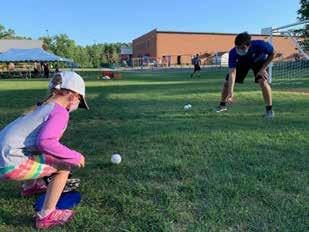26
SARATOGA FAMILY | FALL 2020
Things to Know
5
ABOUT FALL ALLERGIES
A
s summer cools into fall, we can say goodbye to grass allergens and hello to ragweed. Fall allergy season is upon us, so we sat down with board-certified allergist Lorelei Bourla, MD, to learn more about minimizing these pesky symptoms.
Dr. Bourla is spearheading Saratoga Hospital Medical Group – Allergy and Clinical Immunology in Wilton, where she diagnoses and treats people of all ages. She says the most significant allergen in the fall is weed pollen, like ragweed, which actually started rising in August this year. The level of allergens in any season is dependent on the season before, which affects a plant’s reproduction of pollen.
Typically, tree pollens are highest in spring, grass pollens in summer, and weed pollens in fall. Seasonal allergies can affect any age group, so if your toddler seems to have a cold but no fever, be sure to ask the pediatrician if it’s time to consult an allergist. “The mainstay for any allergy treatment is avoidance, such as staying away from pets with dander or not eating that strawberry,” Dr. Bourla says. “Seasonal allergies are harder to avoid, since they are in the air we breathe. So we try the next best thing, managing your symptoms so you can get through your day. If nothing else works, you may want to consider allergy shots.”
BEFORE HAVING TO RESORT TO ALLERGY SHOTS, DR. BOURLA OFFERS THESE TIPS:
1
Identify your triggers. Make notes of when and where your symptoms begin. Did they happen last year at this time? Do they flare up more often when petting the dog or doing yard work? Share this information with your allergist.
4
3
2
Get an allergy test. Knowing whether it’s weeds, mold, dust mites, or some other allergen can help identify which treatment works best for you.
Prepare for school allergens. Fall can be challenging
for children who are allergic to classroom pets, or foods others bring to class. Make sure your child’s school and your child know what to do should an asthma or allergic incident occur.
Pay attention to the weather. High humidity
can encourage mold growth. Windy days can bring allergens from many miles away into your backyard. Heavy rains can aerosolize allergens from the ground. Weather reports often provide pollen count levels along with daily forecasts.
5
Start your treatment before the season starts. If you are using over-the-counter
non-sedating antihistamines or intranasal steroids, be sure to use them every morning before you leave for the day. Starting your regimen before your symptoms hit can help you better enjoy your fall, whether you are hiking, horseback riding, leaf-peeping, or just playing outside.
Saratoga Hospital Medical Group – Allergy and Clinical Immunology is located on Saratoga Hospital’s Wilton campus at 3044 Route 50 in Saratoga Springs, NY. You can make an appointment with Dr. Bourla at 518-886-5814.
Lorelei Bourla, MD, Saratoga Hospital Medical Group – Allergy and Clinical Immunology


















